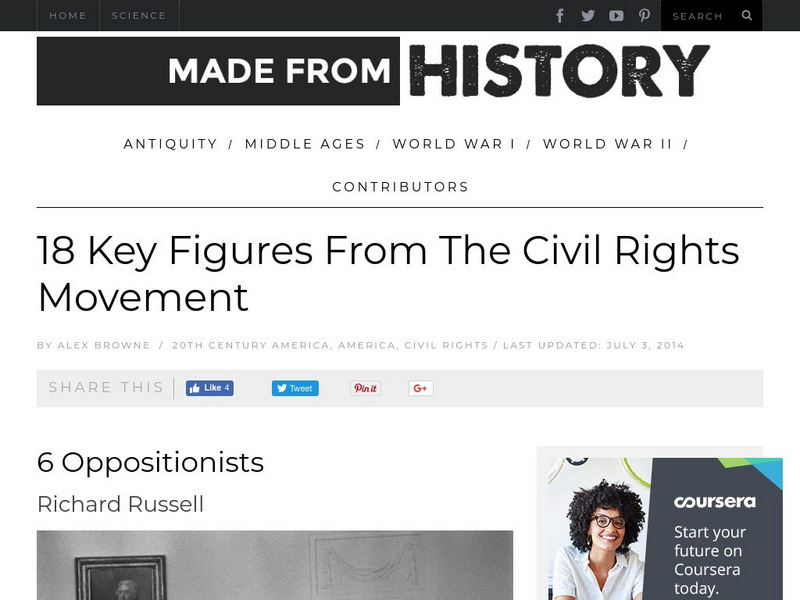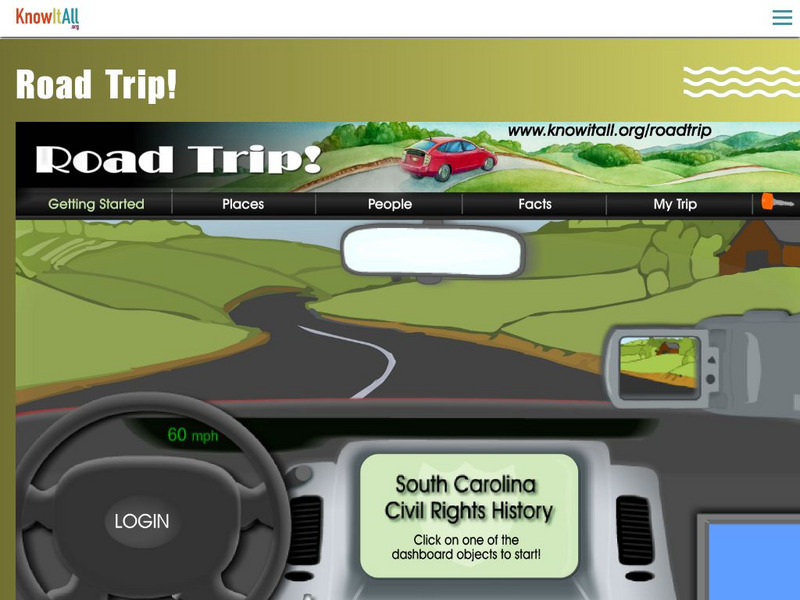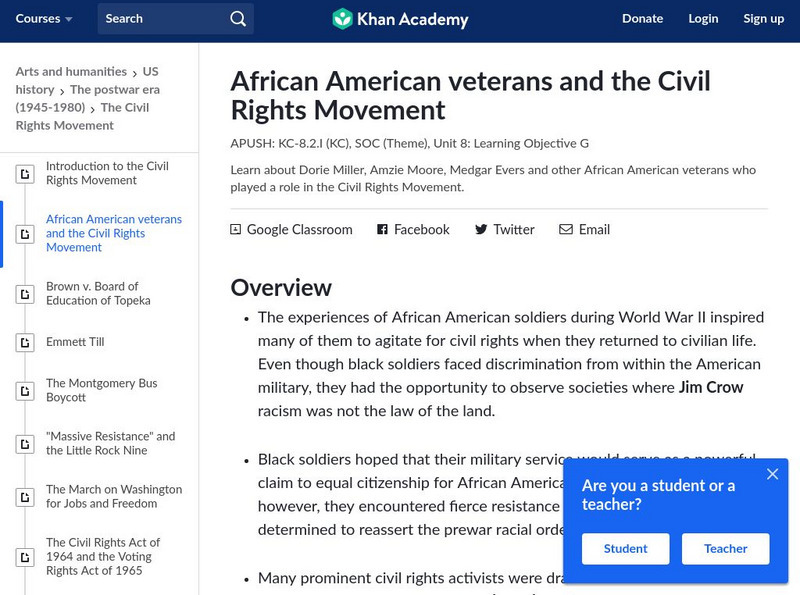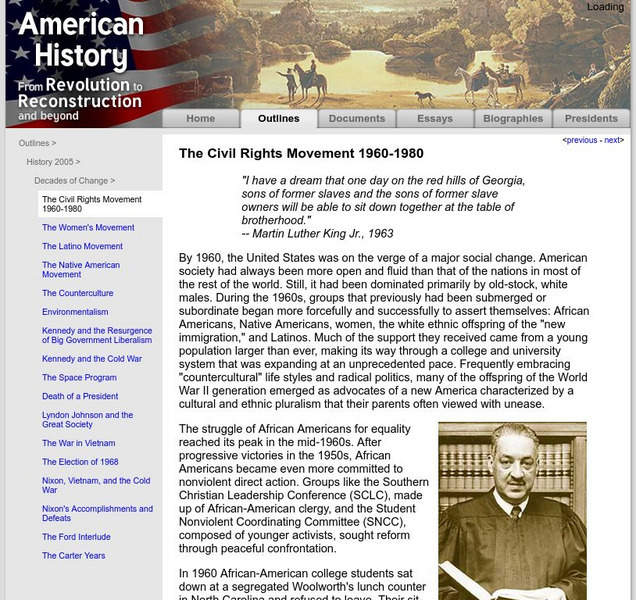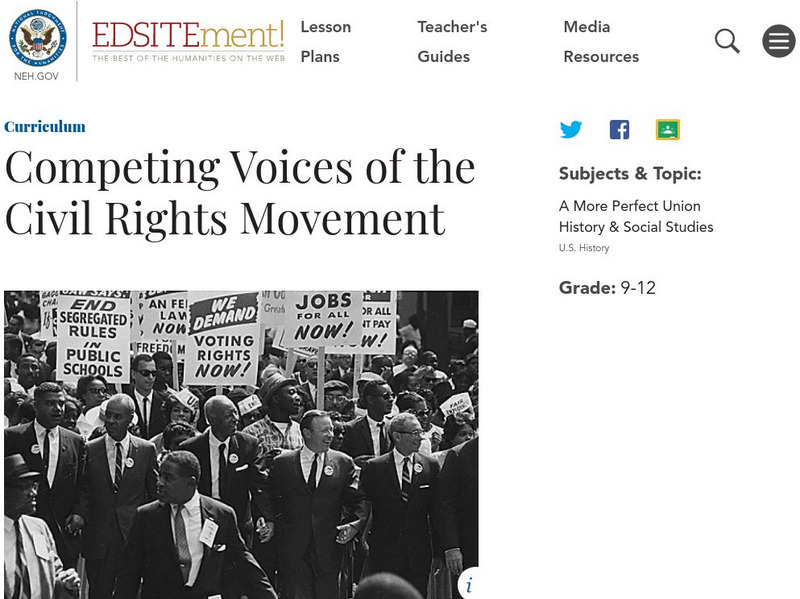PBS
Pbs Learning Media: Fannie Lou Hamer Civil Rights Movement in Rural Mississippi
A collection that uses primary sources to explore Fannie Lou Hamer and the civil rights movement in rural Mississippi.
CommonLit
Common Lit: Text Sets: The Civil Rights Movement
This is a collection of 34 Grade-Leveled texts (4-12)on the topic The Civil Rights Movement. The Civil Rights Movement emerged after nearly a century of little progress for African Americans following the end of slavery. Explore the...
Other
Accord Freedom Trail: Freedom Trail St. Augustine Civil Rights Movement
The city of St. Augustine, Florida played a part in The Civil Rights Movement. The early background of African Americans and slavery issues is documented, followed by noted people, events, and battles in the St. Augustine area during the...
Gilder Lehrman Institute of American History
Gilder Lehrman Institute: The Civil Rights Movement: Major Events and Legacies
[Free Registration/Login Required] An essay that speaks of the major events and legacies of the Civil Rights Movement.
Made From Media
Made From History: 18 Key Figures From the Civil Rights Movement
This collection of images showcases people who played pivotal roles in the Civil Rights movement of the 1960s.
Khan Academy
Khan Academy: Us History: 1945 1980: The Civil Rights Movement Expands
A quick comprehension check over the expansion of the Civil Rights Movement.
University of Groningen
American History: Documents: George C. Wallace Speech: The Civil Rights Movement
View the complete speech by Alabama governor George Wallace condemning the Civil Rights Act.
Khan Academy
Khan Academy: Introduction to the Civil Rights Movement
Provides an overview and basic introduction to the civil rights movement of African Americans.
Choices Program, Brown University
Choices: Black Lives Matter: Continuing the Civil Rights Movement
Learning module with multi-media resources, including interactive timeline, video, photos and articles, from which students can explore the current Black Lives Matter movement and make connections to activism of the past and the role of...
PBS
Pbs Learning Media: American Exp: Southern Response to Civil Rights Speech, 1948
In response to Harry Truman's views of civil rights, a Democrat from Mississippi voices his displeasure in the concept of a Civil Rights Movementto grant equal freedoms to all citizens of the United States.
Yale University
Yale New Haven Teachers Institute: Mosaic America: Civil Rights Movement
A lesson unit designed to outline the civil rights movement as seen through the eyes of African Americans, Chicanos, and Native Americans.
PBS
Pbs Learning Media: Civil Rights Special Collection
Multimedia collection of video, primary text documents and audio on Civil Rights, especially Brown vs. Board of Education.
University of Virginia
Virginia Center for Digital History: Television News of the Civil Rights Era
A rich collection of streaming video samples of television news footage from 1950 to 1970, along with an assortment of primary source documents, first-person accounts, a glossary of terms, and essays and analysis for learning about the...
PBS
Pbs Learning Media: American Masters Collection: Sammy Davis Jr.
This is a collection of three video lessons about Sammy Davis Jr., comedy, race, segregation in 1960's Hollywood, politics, identity, and The Civil Rights Movement.
South Carolina Educational Television
Etv: Road Trip! Through South Carolina Civil Rights History
A collection of videos that take you on a journey through South Carolina to learn about significant events from the civil rights movement that took place there from the 1940s to the 1970s. Includes maps, photo galleries, interactives,...
Made From Media
Made From History: State by State History of 20th Century American Civil Rights
This interactive United States Map allows students to see how slavery split the country into two sides, but the Civil War did not resolve their differences. Each state featured is assigned a short quote, story, or fact that illuminates...
National Humanities Center
National Humanities Center: Teacher Serve: Freedom's Story: The Civil Rights Movement: 1968 2008
An excellent essay from the National Humanities Center that explores the civil rights movement after the groundbreaking legislation in the 1960s. It looks at how the civil rights movement has transitioned in the last part of the 20th and...
Khan Academy
Khan Academy: African American Veterans and the Civil Rights Movement
Many African American veterans joined the Civil Rights Movement after World War II when they found themselves facing continued discrimination at home. Learn about some of the veterans who were prominent activists.
Khan Academy
Khan Academy: Us History: 1945 1980: Early Steps in the Civil Rights Movement
A quick comprehension check over the early steps in the Civil Rights Movement.
University of Groningen
American History: Outlines: Origins of the Civil Rights Movement
Overview of the beginning of the Civil Rights Movement in post World War II America.
University of Groningen
American History: Outlines: The Civil Rights Movement 1960 1980
Section overview of the major accomplishments and changes in strategy developing during the Civil Rights Movement between 1960 to 1980.
Khan Academy
Khan Academy: Us History: 1945 1980: Introduction to the Civil Rights Movement
Learn about the origins, strategies, and unfinished business of the Civil Rights Movement in the United States.
National Endowment for the Humanities
Neh: Edsit Ement: Freedom Riders and Popular Music of the Civil Rights Movement
In this lesson plan, students will consider "The Freedom Riders and the Popular Music of the Civil Rights Movement." The plan includes worksheets and other student materials that can be found under the resource tab.
National Endowment for the Humanities
Neh: Edsit Ement: Competing Voices of the Civil Rights Movement
In this Curriculum Unit, students will consider "Competing Voices of the Civil Rights Movement" in 2 Lessons. The unit also includes worksheets and other student materials that can be found under the resource tab.



